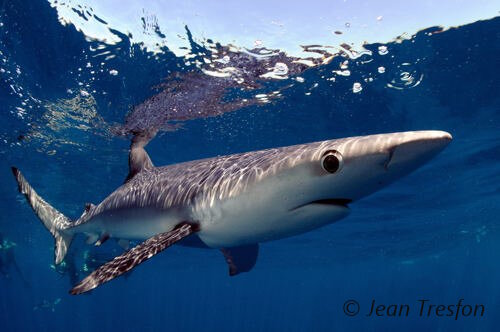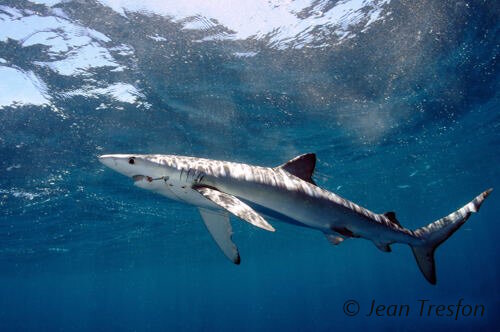Sealife guideThe blue sharkPrionace glauca
Last updated on 08/29/2024 at 12:21 AM
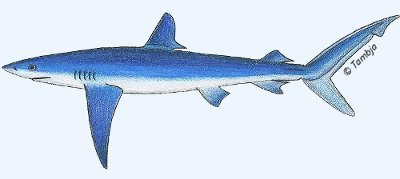
The blue shark (Prionace glauca)
Taxonomy
- Common name: Blue shark
- French name: Requin bleu, peau bleue
- Scientific name: Prionace glauca (Linnaeus, 1758)
- Family name: Carcharhinidae
- Order name: Carcharhiniformes
- Class name: Elasmobranchii
Description
The blue shark is a pelagic shark with a maximum size of about 12.5 feet in length and a weight of around 440 pounds.
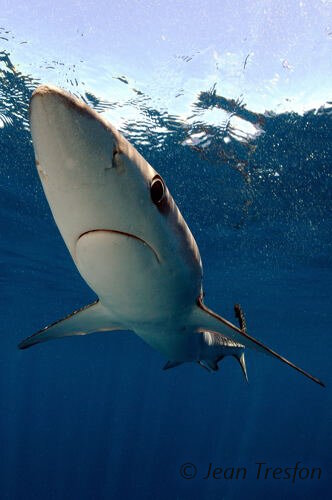
The blue shark has a long pointed nose !
The blue shark is characterized by its bluish coloration on the top side of its very slender body. It also has a long, pointed nose and long pectoral fins.
Geographic range
The blue shark is widely distributed in temperate and tropical waters across the world’s seas and oceans. It is likely the most widespread shark in the oceans, found almost everywhere except the cold waters of the polar oceans.
Blue shark migration is seasonal and depends on the distribution and abundance of their prey.
Habitat
Blue sharks can be found from the surface down to depths of over 1,150 feet. Since they prefer water temperatures around 54 to 68°F, their depth range varies accordingly. In tropical waters, where temperatures are higher, blue sharks are typically found at greater depths !
The blue shark is a pelagic and oceanic species that generally lives a solitary life offshore.
Diet
As a major predator, the blue shark plays a key role in maintaining the balance of the marine ecosystem. It primarily feeds on small pelagic fish, squids, pelagic crustaceans, and occasionally on seabirds or marine mammal carcasses. While it can feed during the day, it is more active in searching for food at night.
Reproduction
The blue shark is viviparous. After a gestation period of 9 to 12 months, the female gives birth to an average of 30 pups, and occasionally more than 100 in exceptional cases, each measuring 14 to 20 inches in length. Young blue sharks reach sexual maturity at around 4 to 6 years of age with lengths ranging from 5.9 to 7.2 feet !
The growth rate of the blue shark is among the fastest of any shark species.
Did you know ?
The blue shark is listed as many other marine species within The IUCN Red List of threatened species. The blue shark appears in the IUCN Red List since 2019 within the category Near Threatened !
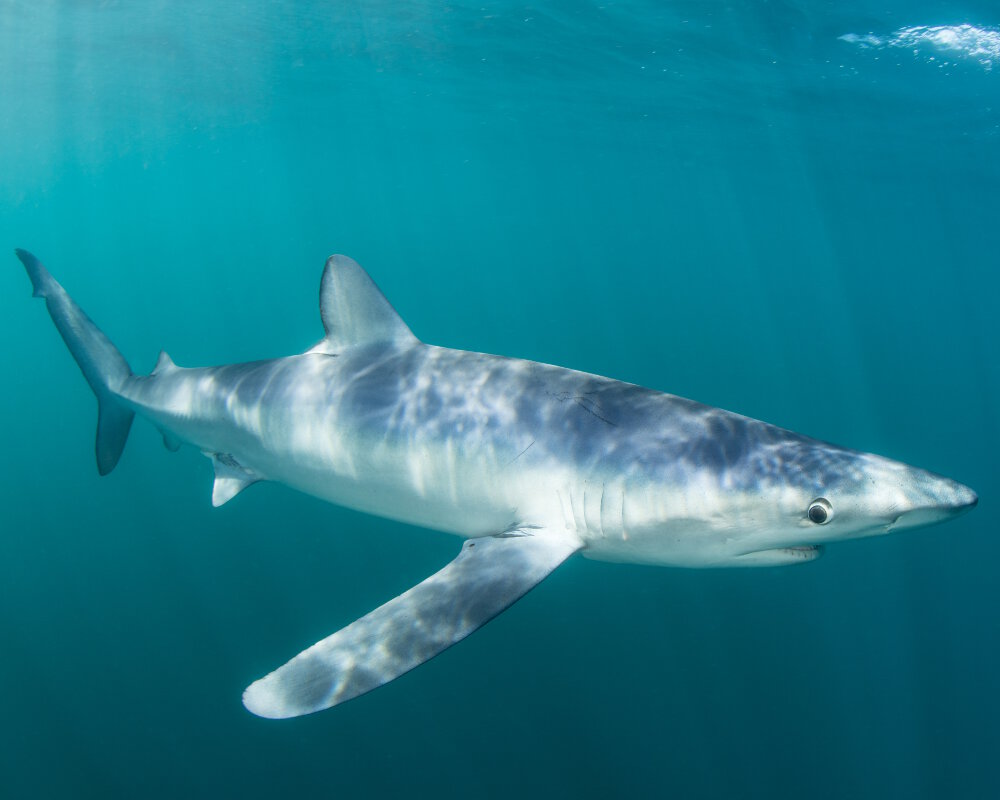
The blue shark (Prionace glauca) © Ethan Daniels | Dreamstime.com
Within the same family
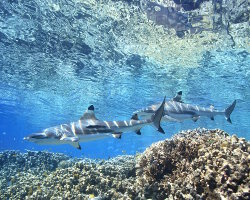
Blacktip reef shark
(Carcharhinus melanopterus)
(Carcharhinus melanopterus)
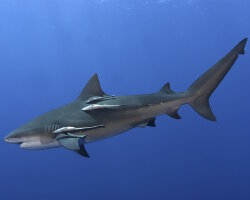
Bull shark
(Carcharhinus leucas)
(Carcharhinus leucas)
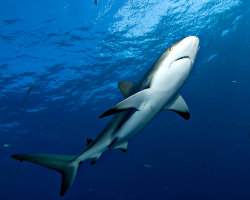
Caribbean reef shark
(Carcharhinus perezi)
(Carcharhinus perezi)
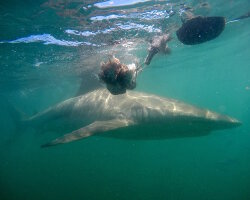
Copper shark
(Carcharhinus brachyurus)
(Carcharhinus brachyurus)
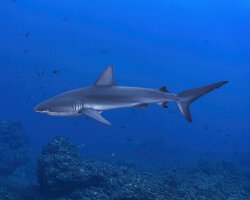
Galapagos shark
(Carcharhinus galapagensis)
(Carcharhinus galapagensis)
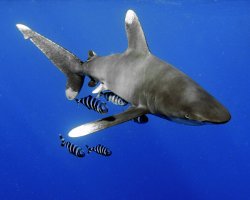
Oceanic whitetip shark
(Carcharhinus longimanus)
(Carcharhinus longimanus)
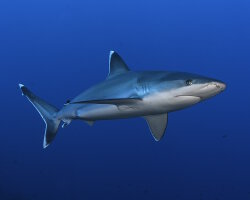
Silvertip shark
(Carcharhinus albimarginatus)
(Carcharhinus albimarginatus)
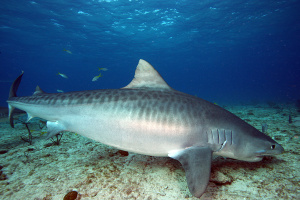
Tiger shark
(Galeocerdo cuvier)
(Galeocerdo cuvier)
Discover also
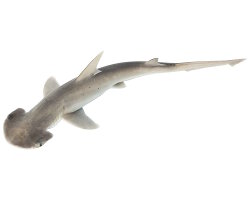
Bonnethead shark
(Sphyrna tiburo)
(Sphyrna tiburo)
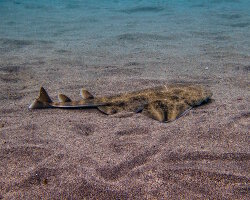
Common angelshark
(Squatina squatina)
(Squatina squatina)
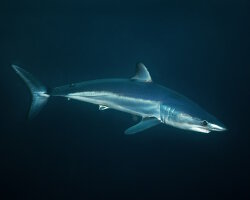
Longfin mako
(Isurus paucus)
(Isurus paucus)
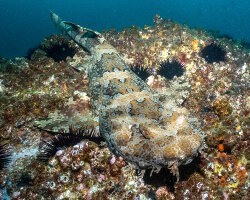
Ornate wobbegong
(Orectolobus ornatus)
(Orectolobus ornatus)
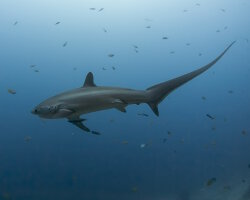
Pelagic thresher shark
(Alopias pelagicus)
(Alopias pelagicus)
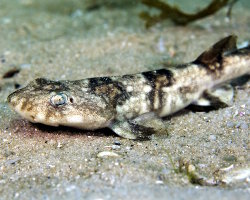
Puffadder shyshark
(Haploblepharus edwardsii)
(Haploblepharus edwardsii)
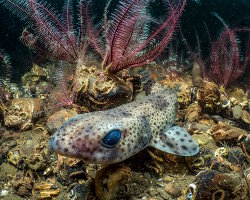
Small-spotted catshark
(Scyliorhinus canicula)
(Scyliorhinus canicula)
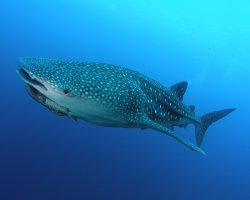
Whale shark
(Rhincodon typus)
(Rhincodon typus)
Our latestUpdates
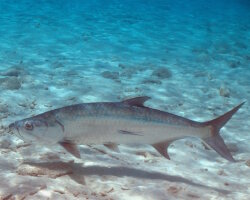
Wednesday, February 18th 2026
The Atlantic tarpon
The Atlantic tarpon is a large coastal fish that can grow up to 8 feet long and weigh over 330 pounds, with a silvery body covered in large, reflective scales. Known as the Silver King, it is famous for its spectacular leaps and fierce fight when hooked by sport fishermen.
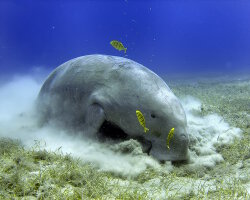
Friday, January 30th 2026
The dugong
Discover the dugong, a gentle “sea cow” of tropical waters. Learn about its habitat, diet, reproduction, morphology, and the threats facing this unique marine mammal.
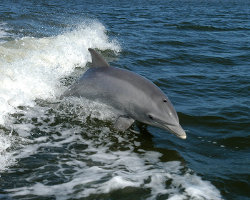
Friday, January 23rd 2026
Dolphins: ocean's smartest creatures
Discover dolphins, the ocean's geniuses: explore their intelligence, social behavior, sophisticated communication, species diversity and vital role in marine ecosystems.
Photo of the Day
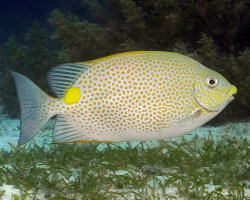
Poisson lapin tacheté d'or
(Siganus guttatus)
(Siganus guttatus)

